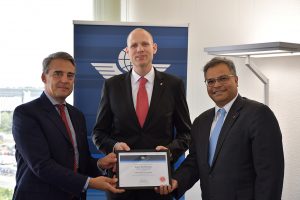No products in the cart.
Swiss WorldCargo obtains CEIV-Pharma certification
 Zurich-based carrier Swiss WorldCargo, the air cargo division of Swiss International Airlines, has gained its CEIV-Pharma certification this week, assuring that all segments of its supply chain network, operating in more than 84 countries, meet the strict temperature-control standards set by IATA.
Zurich-based carrier Swiss WorldCargo, the air cargo division of Swiss International Airlines, has gained its CEIV-Pharma certification this week, assuring that all segments of its supply chain network, operating in more than 84 countries, meet the strict temperature-control standards set by IATA.
The carrier, while small, has carved out a niche in the sector of transporting pharmaceuticals internationally out of Western Europe. In 2016, it introduced “quality corridors”– or dedicated pharma traffic lanes – in partnership with cargo handler Cargologic, and food and gateways services provider Singapore Airport Terminal Services Ltd. (SATS). The consortium launched the service with a Singapore-Zurich route.
Swiss WorldCargo is also recognized as compliant with the Good Distribution Practices (GDP) standards by government authority Swissmedic – which issues GDP certificates to Switzerland-based companies. The merits of IATA’s pharma certificate have often been compared to the GDP’s standards.
There are major players on both sides of the fence – GDP-compliant companies including Panalpina, dnata, Cargolux Airlines and Emirates SkyCargo – along with Delta Cargo, Cathay Pacific, All Nippon Airways and Hactl, which hold CEIV-pharma certifications. While many pharma-centric companies opt for one or the other, some diversify their portfolios with a combination of the two frameworks, like Swiss WorldCargo.
Industry leaders have their own opinions on the debate – Nathan de Valck, cargo manager at major pharma-hub Brussels Airport has said that GDP standards are a good foundation, but that there is “no real checklist,” associated with the framework. IATA’s CEIV standards, on the other hand, “actually take GDP standards and translate them to actionable items for our industry,” he said.
Looking forward, Swiss WorldCargo said it will continue to develop its “pharma road map to improve its footprint in the important and growing segment of pharmaceuticals and life sciences.”
















